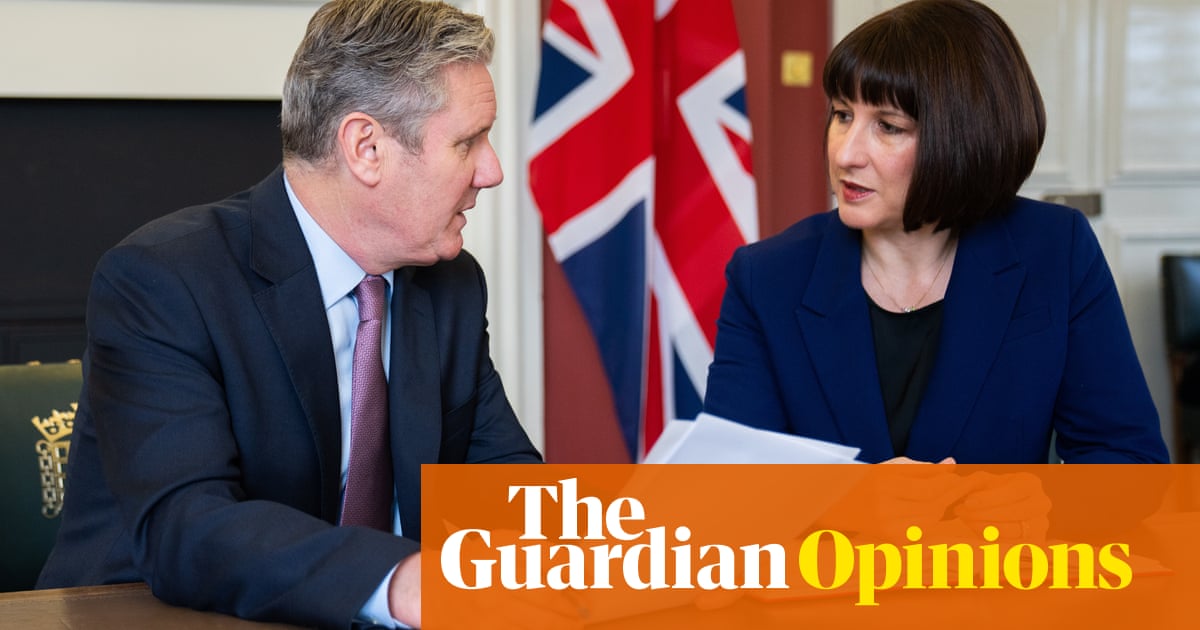“Labour is running scared!” blasts the Telegraph. How did that happen? To see a party with an unswerving 20% lead chased away from its headline policy by Tories whose own MPs are fleeing defeat in droves – 89 on the chicken-run at the last count – looks a bit like a doberman running away from a chihuahua.
Labour’s famous £28bn green plan has been bungled, undermining the value of having a green prosperity plan. Even if it’s now half the size it was, that’s still a greener prospect than anything the Tories will offer. But the slow-motion U-turn has been excruciating, and it would have been better from the start not to punt up a large single number. While pared down, the plan is still the only growth policy in town, with its beefed up windfall tax on oil and gas companies and £13bn borrowing to lever in private investment.
Industry told Labour what it most needs is the iron certainty that would encourage investment. “Better to be honest now,” Rachel Reeves tells me. “When the facts change, we change our mind”. That’s a Keynesianism: the question is how much of Keynesian philosophy dare they take into office? Blame Liz Truss, says Reeves: “£28bn was in a different era, when interest rates were 0.1%. We never envisaged the damage they would do.” Blame Jeremy Hunt: he has “maxed out the credit card”, she says, recklessly scorching the earth for his successor.
There were daily Tory attacks on the £28bn plan and they had an effect because Labour worries still that it is only marginally ahead in the polls on how “best to manage the economy”.
But that’s OK, according to the polling expert John Curtice, because that’s exactly where Labour was in 1997 when Tony Blair and Gordon Brown were even more fiscally rigid: at least Starmer and Reeves haven’t, unlike those predecessors, glued themselves to Hunt’s impossible spending plans for the next two years. They should challenge Hunt every day on the monster £20bn spending cut he has lobbed into this March’s fantasy budget, leaving Richard Hughes, head of the Office for Budget Responsibility, protesting that the budget is “a work of fiction”.
So was Labour’s retreat about the optics, or the economics? For if borrowing too much was the Tory accusation, that’s not a great issue with the public. YouGov recently found the public unconcerned about public debt: 45% would rather spend on public services than pay down debt, only 16% choosing debt repayment.
And what will be the damage? The U-turn is politically risky, the pollsters say, because it confirms the negatives voters already associate with Starmer and Labour, amplified by Sunak’s perpetual jibe that Starmer “doesn’t have a plan”, that he flip-flops, that we “don’t know what he stands for”.
But it will probably be surface damage. “Essentially, the next election is gifted to Labour, with Johnson, Partygate and Truss hanging like an albatross around the Tories’ neck,” is how Curtice sees things. “Labour has a lot more room to manoeuvre.”
after newsletter promotion
Not least on the climate. “Tory voters are also concerned, there’s no enormous divide with Labour voters on this,” he says. Ipsos polling confirms that 44% want a government to take strong action on climate, only 33% preferring slower action. And tax needn’t be a stumbling block. “The public expect taxes to rise after the election,” Curtice says. “They are far more worried about public services, the NHS and the economy than about tax.” No need to fear the tactic of Hunt’s tax cuts either, he says: John Major cut income tax twice before crashing out in 1997. “What’s the point of 1p off tax if nothing works?”
Talk to Gideon Skinner of Ipsos and hear the same thing. “Seventy-nine per cent of those considering voting Labour are already expecting tax to rise,” he says. It seems that tax-rise phobia sits deeper in Labour’s folk memory of lost elections than in the minds of voters today.
Amid the furore of a policy pruned back and hopes dashed, Rachel Reeves said to me: “I will still be Britain’s first green chancellor.” The bar for that is not particularly high. And amid the disappointment, what do we do now? My advice is to look Starmer and Reeves in the eye and know that they will be bolder after election day than they seem now. Why? Because every Labour government has always done far more than it promised. That requires trust, of which there’s an acute deficit right now. But after the last election, the worst Labour defeat in living memory, don’t underestimate the political magicians who have carried Labour to a near-unassailable lead. Keep this in mind: they must be doing something right.







